Organised in collaboration with the Institute for Economics and Peace (IEP) and the Libyan Peace Institute, this session will explore how strategic business investments and trade reforms can contribute to sustainable peace and economic resilience in Libya.
Libya’s WTO accession process, though currently dormant, presents an opportunity for vital reforms that can support long-term stability. This workshop will highlight the role of private sector-led initiatives in fostering an enabling environment for responsible investment, innovation, and inclusive growth. Through expert insights and interactive discussions, participants will gain practical strategies for leveraging trade and private sector engagement as tools for peacebuilding.
Speaker Line-up
- Opening Remarks: Lamia Fathi Abusedra – Permanent Representative, State of Libya to the UN and other international organisations
- Serge Stroobants – Director of Europe and MENA, Institute for Economics and Peace
- Frederik Teufel – Lead Coordinator, Transition States Coordination Office, African Development Bank
- Haitham Misbah Rajab – Assistant Executive Director for Digital Commerce Affairs, Libya Trade Net
- Abdalla Hamed – President, Libyan Peace Institute
- Moderator: Hilda Al-Hinai – Secretary-General, Arab-Swiss Chamber of Commerce and Industry
The workshop will take place during the Trade for Peace Week on 20 February 2025.
Hosted by the World Trade Organization (WTO), the 4th edition of Trade for Peace Week will take place from 17-21 February 2025. Under the theme “Expanding Horizons: Integrating the Private Sector & Advancing the Trade for Peace Programme”, the event will bring together policymakers, economists, and peacebuilding experts to explore new strategies for strengthening the link between trade and peace.
The Trade for Peace Programme highlights the critical role of trade and economic integration in fostering peace and security. By bridging the trade, peace, and humanitarian communities, the initiative seeks to leverage the multilateral trading system to promote stability, particularly in fragile and conflict-affected regions.






